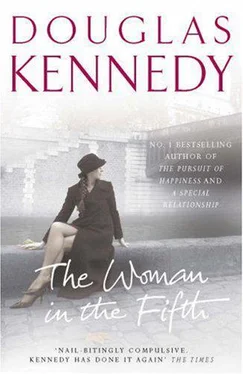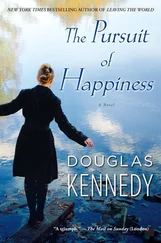Then I would call her and tell her that I couldn’t wait until 5 p.m. tomorrow; that I had to see her now. And I’d hop in a cab over to 13 rue Linne and …
Completely blow this affair before it has started.
A little detached cool is demanded here, mon pote .
So when I woke up at two that afternoon, I picked up my wages and ate steak-frites at a little cafe near the Gare de l’Est, and then took an extended mid-evening stroll along the Canal Saint-Martin, and caught a 21h30 screening of Chabrol’s La Femme infidele at the Brady (they were doing a mini-festival of his films), and walked to my job, thinking at length about Chabrol’s complex morality tale. The story is an old one: a husband discovers his wife’s infidelity. He confronts and kills her lover, at which point …
But here’s where Chabrol pulls a very interesting rabbit out of the hat. Upon discovering that her husband has murdered her amant , the wife doesn’t become hysterical and hyper-moralistic. Nor does she turn him over to the cops. Rather, the couple become collaborators in the crime — the notion being that, in any intimate relationship (especially one that has lasted many years), we are always complicit with the other person. And once the frontier of sexuality is crossed, we are, in some ways, hostages to fortune. You can compartmentalize, you can tell yourself that you know the person with whom you are sleeping is rational and playing on the same page as you … and then you discover one of life’s great truisms: you can never really know the landscape of somebody else’s mind.
But how desperate I was to cross that frontier with Margit.
Still … discipline, discipline.
So I didn’t call her until the following afternoon — from a phone kiosk on the rue des Ecoles. I inserted my France Telecom card. I dialed her number. One rings, two rings, three ring, four rings … oh shit, she’s out … five rings, six …
‘Hello?’
She sounded groggy, half-asleep.
‘Margit, it’s me … Harry.’
‘I figured that.’
‘Did I wake you?’
‘I was just … dozing.’
‘I can call back if …’
‘No need to be solicitous. I expected you to call now … just as I expected you not to call yesterday.’
‘And how did you figure that?’
‘Because I knew, though you might be eager to see me again, you wouldn’t want to seem too eager, so you’d wait a day or so before calling me. But not more than that, because that would indicate disinterest. The fact that you rang exactly at five p.m… . especially after I told you that I shouldn’t be disturbed before that hour …’
‘Shows how completely predictable men are?’
‘Your statement, monsieur , not mine.’
‘So do you want to see me or not?’ I asked.
‘American directness. J’adore …’
‘I’ve posed a question.’
‘Where are you exactly right now?’
‘Near Jussieu.’
‘My metro stop. How convenient. Give me thirty minutes. You have my address?’
‘I do.’
‘Here’s the code: S877B. Second staircase, then third floor, right. A plus tard .’
Her place was a three-minute walk from the Jussieu metro . The area — seen in the half-light of a late-March afternoon — was a mixture of old apartment blocks and a clustered exercise in sixties concrete brutalism that turned out to be a branch of the University of Paris. For all my flaneur -ing around Paris, I had never ventured down this way (always stopping at the Grand Action cinema on the rue des Ecoles, then turning left toward the river). So it was intriguing to happen upon the Jardin des Plantes. It was a surprisingly large and unexpectedly sauvage green space in the middle of the Fifth arrondissement. I wandered inside — following an inclining path up past tall trees and exotic flora until it reached a meadow-like area, slightly overgrown, with a stone cupola house in the midst of this Elysian field. Had I been a film director, out scouting a location for an urban update of A Midsummer Night’s Dream , this would have won hands down. There was even a small hill — accessed by a winding path — the summit of which brought me into a pagodastyle viewing platform. The view from here wasn’t wildly panoramic. Rather, it was a vista of rooftops and chimney pots and sloping windows. There was nothing monumental about this prospect. But seen in the declining afternoon light, it still looked monochromatic and painterly: an urban still life, and one which was, by and large, out of public view. Rooftops are romantic — not just because they are, metaphorically speaking, adjacent to the sky, but also because they are hidden away. Stand on a rooftop and you cannot help but have simultaneous thoughts about life’s infinite possibilities and the omnipresent potentiality for self-destruction. Look to the heavens and you can think, Everything is possible . Look to the heavens and you can also think, I am insignificant . And then you can shuffle your way to the edge of the roof and look down and tell yourself, Just two steps and my life would be over. And would that be such a horrendous thing?
No wonder the Romantics so venerated suicide. Seen as a response to life’s fundamental despair, it was regarded as a grand final creative act: an acceptance of tragedy through the ultimate embrace of tragedy.
But why think such tragic thoughts when the prospect of sex was just ten minutes away? Ah, sex: the great antidote to all despair.
I walked down off the hill and out of the Jardin. I crossed the street and found a small grubby corner shop which sold just about everything — including champagne. The Arab guy behind the till said that he had one bottle on ice in the back. I bought it. When I asked if he sold condoms, he avoided my eyes as he said, ‘There is a machine on the next street corner.’
I walked down to the machine. I inserted a two-euro coin. I pulled open the metallic drawer and withdrew a three-pack of Durex, presented in a plastic case. I checked my watch. It was 5.28.
13 rue Linne was an undistinguished building — early nineteenth century, of considerable width, with an imposing black door. There was a kebab place sharing its left flank; a reasonable-looking Italian restaurant its other side. The code pad was to one side of the door. I opened my notebook and punched the necessary combination of numbers and letters. There was the telltale click. I pushed open the door, feeling nervous.
As always, I was in a courtyard. But this courtyard was different from all the others I had entered in Paris: it was light and airy and leafy. Paved in cobblestones, it also looked clean and well maintained. There was no laundry hanging from the balconies — only flower boxes and trellises around which plants had been interwoven. There was no loud jungle music coming from open windows. Just absolute bourgeois silence. At the entrance to the first stairwell, there was a collection of professional plaques:
M. Claude Triffaux
Psychologue
2e etage, gauche
Mme B. Semler
Expert Comptable
1er etage, droite
M. Francois Marechal
Kinesitherapeute
1er etage, gauche
I smiled at the thought of an accountant — a man who deals with the financial narrative of one’s life (and the stressful business of paying taxes) — working across the hall from someone who dealt with trapped nerves and seized muscles and other physical manifestations of life’s assorted vicissitudes.
Читать дальше












